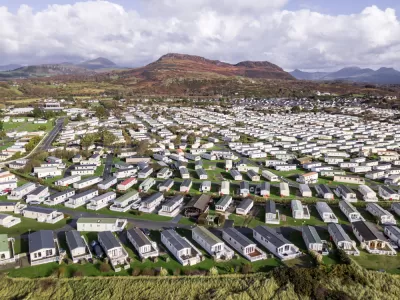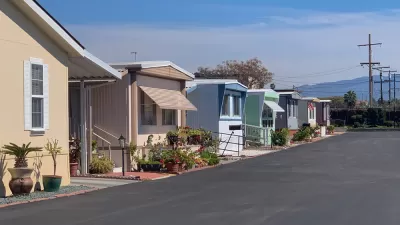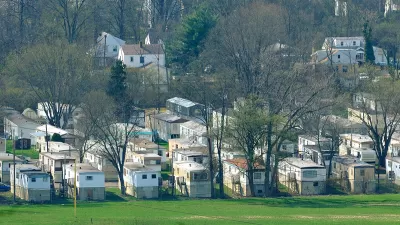With demand surging and rent costs rising sharply, mobile home parks are becoming unaffordable for their most vulnerable residents.

In an article for The Washington Post, Abha Bhattarai highlights growing fears among mobile home residents as rent increases hit mobile home parks around the country. “Surging home prices and rents are cascading down to the country’s mobile home parks, where heightened demand, low supply and an increase in corporate owners is driving up monthly costs for low-income residents with few alternatives.” As we noted in a story last year, “private-equity firms and developers are often circling nearby, looking to buy up such properties and turn them into more lucrative ventures, including timeshare resorts, wedding venues and condominiums.”
With roughly 20 million Americans living in manufactured homes, rising costs for this historically affordable housing option are putting some of the country’s lowest-income households in peril of losing their homes. Although many mobile home residents own their trailer, rising land rents, the cost of moving a mobile home, and a lack of regulations on mobile home rent in most cities put mobile home owners in a precarious position.
“The circumstances surrounding mobile homeownership are yet another way the housing market has worsened long-standing inequities,” Bhattarai writes. “While homeowners enjoyed cheaper mortgages during the pandemic, loans for buying manufactured homes often come with higher interest rates, limited opportunities to refinance and fewer protections than those for typical mortgages, according to a Consumer Financial Protection Bureau report.”
FULL STORY: ‘We’re all afraid’: Massive rent increases hit mobile homes

Planetizen Federal Action Tracker
A weekly monitor of how Trump’s orders and actions are impacting planners and planning in America.

USGS Water Science Centers Targeted for Closure
If their work is suspended, states could lose a valuable resource for monitoring, understanding, and managing water resources.

Congress Moves to End Reconnecting Communities and Related Grants
The House Transportation and Infrastructure Committee moved to rescind funding for the Neighborhood Equity and Access program, which funds highway removals, freeway caps, transit projects, pedestrian infrastructure, and more.

Integrating Human Rights Into Energy and Extractive Sector Transitions
Why just transition efforts must move beyond economic considerations by embedding human rights principles into business practices to ensure equitable, transparent, and accountable outcomes for affected communities and workers.

Blocked, Restored, Blocked Again — Housing Funds in Legal Limbo
Since Trump took office, the administration has blocked multiple affordable housing funding streams. Here's a look at which funds have been frozen, which have been reinstated, and which are in the courts.

Mapping Groundwater Risks from Orphan Wells Across U.S. Aquifers
A new USGS study reveals that more than half of the nation’s documented orphan wells lie within aquifers supplying the vast majority of U.S. groundwater, posing widespread risks of contamination from aging, unplugged infrastructure.
Urban Design for Planners 1: Software Tools
This six-course series explores essential urban design concepts using open source software and equips planners with the tools they need to participate fully in the urban design process.
Planning for Universal Design
Learn the tools for implementing Universal Design in planning regulations.
City of Moorpark
City of Tustin
Tyler Technologies
City of Camden Redevelopment Agency
City of Astoria
Transportation Research & Education Center (TREC) at Portland State University
Regional Transportation Commission of Southern Nevada
Toledo-Lucas County Plan Commissions





























